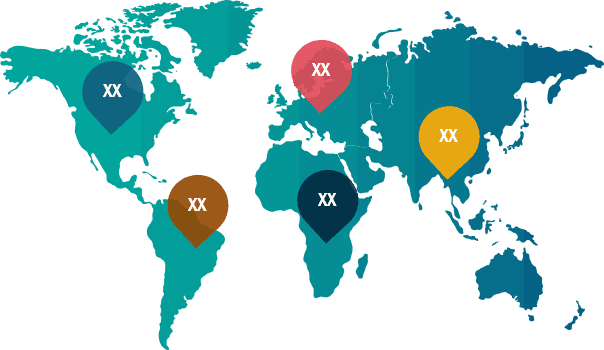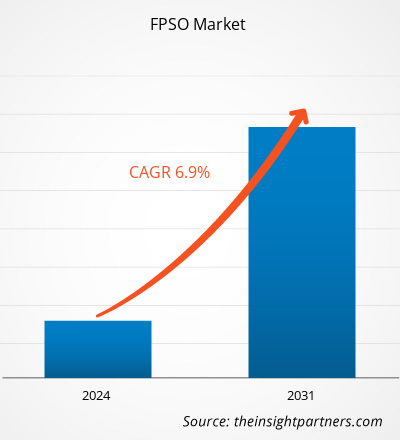FPSO市场规模预计将从 2023 年的 147.298 亿美元增至 2031 年的 251.019 亿美元。预计 2023-2031 年市场复合年增长率为6.9%。石油和天然气行业的不断发展以及石油和天然气勘探活动的增加是FPSO市场的其他一些趋势。
FPSO市场分析
油气项目的不断扩张是刺激FPSO需求的关键因素。对FPSO的需求,尤其是海上的需求,加上适度稳定的油价,加上海上勘探和石油生产活动的激增,预计将在未来五年推动全球对FPSO船舶的需求强劲增长。 Total Energies、Petrobras、CNOOC Ltd、Equinor ASA和 Exxon Mobil 等一些主要FPSO公司正致力于推动FPSO市场的发展。
FPSO市场概况
Equinor ASA等石油和天然气勘探公司专注于深水和超深水石油和天然气勘探活动。例如,2022年,壳牌启动了PowerNap油田的石油生产项目。此外,由于海上技术的发展,石油和天然气公司正在实施新技术,例如可分离的炮塔、圆柱形船体设计和双壳设计。此外,FPSO相对于其他生产系统的技术发展,例如FPSO的数字化以及石油和天然气行业自动化和批次的渗透,增加了市场公司对研发活动和新产品开发的关注度,这将产生以下趋势: FPSO市场未来几年的增长。
定制研究以满足您的要求
我们可以优化和定制我们的标准产品无法满足的分析和范围。这种灵活性将帮助您获得业务规划和决策所需的准确信息。
FPSO市场:

年均复合增长率(2023 - 2031)6.9%- 2023 年市场规模
147.298 亿美元 - 2031 年市场规模
251.019 亿美元

市场动态
- 海上勘探和生产活动数量的增加推动了FPSO的需求
- 海底技术的不断进步
- 天然气和原油需求不断增长
关键人物;主力;重要一员
- 调制解调器公司
- 巴西石油公司
- 布米阿马达有限公司
- SBM Offshore NV
- 中海石油有限公司
- 总能源公司
- 埃克森美孚公司
- BW离岸公司
- 挪威国家石油公司
- 壳牌公司
区域概况

- 北美
- 欧洲
- 亚太
- 南美洲和中美洲
- 中东和非洲
市场细分
 水深【浅水、深水、超深水】
水深【浅水、深水、超深水】 船体【单船体、双船体】
船体【单船体、双船体】 系泊[展开系泊和可分离系泊],
系泊[展开系泊和可分离系泊], 建筑[新建和改建]
建筑[新建和改建]- 示例 PDF 通过定性和定量分析展示了内容结构和信息的性质。
FPSO 市场驱动因素和机遇
海上勘探和生产活动数量的增加推动了 FPSO 的需求
近几十年来,海上石油和天然气勘探和生产大幅加强。此外,全球新发现的石油和天然气储量正在呈指数级增长。巴西国家石油公司等主要石油和天然气开采公司越来越多地参与海上勘探和生产活动。在巴西国家石油公司,大部分石油储量都位于海上油田,这指导了钻井活动。此外,根据IEA的数据,到2040年,巴西海上石油和天然气生产活动的年度资本支出将达到600亿美元。此外,偏远近海地区边际石油储量的开采数量不断增加,加上 FPSO 在没有固定结构支持的情况下运行的灵活性,促进了市场增长。
天然气和原油需求不断增长——FPSO市场机遇
对原油和天然气的需求不断增加,这是FPSO市场增长的主要原因之一。 OPEC 预计 2022 年至 2025 年 OECD 国家的石油需求将呈上升趋势。然而,在预测期内至 2045 年,非经合组织国家的需求预计将增加 22.5 mb/天。 OPEC 报告指出,天然气预计将成为增长最快的化石燃料,并将成为第二大贡献者到 2045 年,预计将占能源结构的 25% 左右。未来几年,由于各工业部门对天然气的使用不断增加,预计亚太地区对天然气的需求将很高。因此,全球对天然气和原油的需求不断扩大,预计将为未来几年 FPSO 市场的增长提供有价值的机会。
FPSO市场报告细分分析
有助于 FPSO 市场分析的关键部分是水深、船体、系泊和施工。
- 根据水深,FPSO市场分为浅水、深水和超深水。到2023年,浅水领域将占据更大的市场份额。
- 根据船体,FPSO市场分为单壳和双壳。到 2023 年,双体船市场将占据更大的市场份额。
- 根据系泊方式,FPSO市场分为展开式系泊装置和可拆卸系泊装置。 2023 年,扩张式系泊装置将占据更大的市场份额。
- 根据建造情况,FPSO市场分为新建和改建。到2023年,新建细分市场将占据更大的市场份额。
FPSO 按地域划分的市场份额分析
FPSO市场报告的地理范围主要分为五个地区:北美、亚太地区、欧洲、中东和非洲、南美洲/中南美洲。
南美洲地区包括巴西、阿根廷和 SAM 的其他地区。 SAM 的其他国家包括智利、哥伦比亚、危地马拉和秘鲁。技术发展对巴西和阿根廷的经济产生了强烈影响,并在很大程度上推动了经济的发展。过去三年来,南美洲的石油应用量逐渐减少。然而,随着原油开采的恢复,这种情况可能会发生变化,企业现在将重点放在更多的石油和天然气勘探和生产活动上,这正在推动南美FPSO市场的需求。
FPSO市场报告范围
| 报告属性 | 细节 |
|---|---|
| 2023年市场规模 | 147.298亿美元 |
| 2031 年市场规模 | 251.019亿美元 |
| 全球复合年增长率(2023 - 2031) | 6.9% |
| 历史数据 | 2021-2022 |
| 预测期 | 2024-2031 |
| 涵盖的细分市场 | 按水深分类[浅水、深水、超深水]按船体分类[单壳、双壳]按系泊方式[展开式系泊、可分离式系泊]、按建造方式[新建及改建] |
| 覆盖地区和国家 | 北美
|
| 市场领导者和主要公司简介 |
|
- 示例 PDF 通过定性和定量分析展示了内容结构和信息的性质。
FPSO 市场新闻和最新动态
FPSO 市场通过收集初级和二级研究后的定性和定量数据进行评估,其中包括重要的公司出版物、协会数据和数据库。以下是创新、业务扩展和战略市场发展的列表:
- 2023 年 5 月,MODEC, Inc. 宣布继续为埃克森美孚圭亚那 Uaru 项目进行 Uaru 浮式生产、储存和卸载船的设计、采购和建造。 (来源:MODEC, Inc.,新闻稿/公司网站/时事通讯)
- 2024 年 4 月,埃克森美孚在获得所需的政府和监管部门批准后,对圭亚那近海 Whiptail 开发项目进行了最终投资。 (来源:埃克森美孚公司,新闻稿/公司网站/时事通讯)
FPSO 市场报告范围和交付成果
《FPSO市场规模和预测(2021-2031)》报告对涵盖以下领域的市场进行了详细分析:
- FPSO 市场规模以及全球、区域和国家层面涵盖的所有主要细分市场的预测
- 市场动态,例如驱动因素、限制因素和关键机遇
- FPSO市场趋势
- 详细的 PEST 和 SWOT 分析
- FPSO 市场分析涵盖主要市场趋势、全球和区域框架、主要参与者、法规和最新市场发展
- FPSO行业、格局和竞争分析,涵盖市场集中度、热图分析、知名参与者和最新发展
- 详细的公司简介
- 历史分析(2 年)、基准年、预测(7 年)及复合年增长率
- PEST 和 SWOT 分析
- 市场规模价值/数量 - 全球、区域、国家
- 行业和竞争格局
- Excel 数据集



Report Coverage
Revenue forecast, Company Analysis, Industry landscape, Growth factors, and Trends

Segment Covered
This text is related
to segments covered.

Regional Scope
North America, Europe, Asia Pacific, Middle East & Africa, South & Central America

Country Scope
This text is related
to country scope.
Trends and growth analysis reports related to Energy and Power : READ MORE..
The Insight Partners performs research in 4 major stages: Data Collection & Secondary Research, Primary Research, Data Analysis and Data Triangulation & Final Review.
- Data Collection and Secondary Research:
As a market research and consulting firm operating from a decade, we have published and advised several client across the globe. First step for any study will start with an assessment of currently available data and insights from existing reports. Further, historical and current market information is collected from Investor Presentations, Annual Reports, SEC Filings, etc., and other information related to company’s performance and market positioning are gathered from Paid Databases (Factiva, Hoovers, and Reuters) and various other publications available in public domain.
Several associations trade associates, technical forums, institutes, societies and organization are accessed to gain technical as well as market related insights through their publications such as research papers, blogs and press releases related to the studies are referred to get cues about the market. Further, white papers, journals, magazines, and other news articles published in last 3 years are scrutinized and analyzed to understand the current market trends.
- Primary Research:
The primarily interview analysis comprise of data obtained from industry participants interview and answers to survey questions gathered by in-house primary team.
For primary research, interviews are conducted with industry experts/CEOs/Marketing Managers/VPs/Subject Matter Experts from both demand and supply side to get a 360-degree view of the market. The primary team conducts several interviews based on the complexity of the markets to understand the various market trends and dynamics which makes research more credible and precise.
A typical research interview fulfils the following functions:
- Provides first-hand information on the market size, market trends, growth trends, competitive landscape, and outlook
- Validates and strengthens in-house secondary research findings
- Develops the analysis team’s expertise and market understanding
Primary research involves email interactions and telephone interviews for each market, category, segment, and sub-segment across geographies. The participants who typically take part in such a process include, but are not limited to:
- Industry participants: VPs, business development managers, market intelligence managers and national sales managers
- Outside experts: Valuation experts, research analysts and key opinion leaders specializing in the electronics and semiconductor industry.
Below is the breakup of our primary respondents by company, designation, and region:

Once we receive the confirmation from primary research sources or primary respondents, we finalize the base year market estimation and forecast the data as per the macroeconomic and microeconomic factors assessed during data collection.
- Data Analysis:
Once data is validated through both secondary as well as primary respondents, we finalize the market estimations by hypothesis formulation and factor analysis at regional and country level.
- Macro-Economic Factor Analysis:
We analyse macroeconomic indicators such the gross domestic product (GDP), increase in the demand for goods and services across industries, technological advancement, regional economic growth, governmental policies, the influence of COVID-19, PEST analysis, and other aspects. This analysis aids in setting benchmarks for various nations/regions and approximating market splits. Additionally, the general trend of the aforementioned components aid in determining the market's development possibilities.
- Country Level Data:
Various factors that are especially aligned to the country are taken into account to determine the market size for a certain area and country, including the presence of vendors, such as headquarters and offices, the country's GDP, demand patterns, and industry growth. To comprehend the market dynamics for the nation, a number of growth variables, inhibitors, application areas, and current market trends are researched. The aforementioned elements aid in determining the country's overall market's growth potential.
- Company Profile:
The “Table of Contents” is formulated by listing and analyzing more than 25 - 30 companies operating in the market ecosystem across geographies. However, we profile only 10 companies as a standard practice in our syndicate reports. These 10 companies comprise leading, emerging, and regional players. Nonetheless, our analysis is not restricted to the 10 listed companies, we also analyze other companies present in the market to develop a holistic view and understand the prevailing trends. The “Company Profiles” section in the report covers key facts, business description, products & services, financial information, SWOT analysis, and key developments. The financial information presented is extracted from the annual reports and official documents of the publicly listed companies. Upon collecting the information for the sections of respective companies, we verify them via various primary sources and then compile the data in respective company profiles. The company level information helps us in deriving the base number as well as in forecasting the market size.
- Developing Base Number:
Aggregation of sales statistics (2020-2022) and macro-economic factor, and other secondary and primary research insights are utilized to arrive at base number and related market shares for 2022. The data gaps are identified in this step and relevant market data is analyzed, collected from paid primary interviews or databases. On finalizing the base year market size, forecasts are developed on the basis of macro-economic, industry and market growth factors and company level analysis.
- Data Triangulation and Final Review:
The market findings and base year market size calculations are validated from supply as well as demand side. Demand side validations are based on macro-economic factor analysis and benchmarks for respective regions and countries. In case of supply side validations, revenues of major companies are estimated (in case not available) based on industry benchmark, approximate number of employees, product portfolio, and primary interviews revenues are gathered. Further revenue from target product/service segment is assessed to avoid overshooting of market statistics. In case of heavy deviations between supply and demand side values, all thes steps are repeated to achieve synchronization.
We follow an iterative model, wherein we share our research findings with Subject Matter Experts (SME’s) and Key Opinion Leaders (KOLs) until consensus view of the market is not formulated – this model negates any drastic deviation in the opinions of experts. Only validated and universally acceptable research findings are quoted in our reports.
We have important check points that we use to validate our research findings – which we call – data triangulation, where we validate the information, we generate from secondary sources with primary interviews and then we re-validate with our internal data bases and Subject matter experts. This comprehensive model enables us to deliver high quality, reliable data in shortest possible time.

 获取此报告的免费样本
获取此报告的免费样本